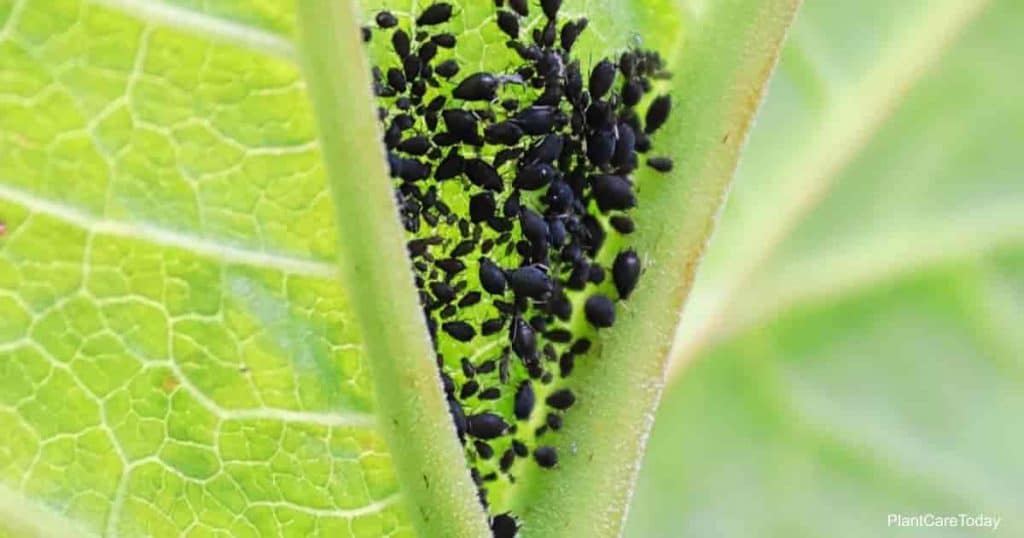How to Get Rid of Black Bugs on Plants
If you have any number of plants in your home or outdoors and have not experienced any pest problems, consider yourself lucky.
If you have had your share of little black bugs infesting your favorite plants, consider yourself normal.
 Pin
Pin Aphid pests seem to find a way to plants one way or another. Some pests are more difficult to remove than others. But where there is a will, there is a spray.
Black aphids (aka Melon aphid – Aphis gossypii) are tiny, oval-shaped insects that multiply quickly and destroy your plant while sucking the sap out of it. Fortunately, there are a variety of sprays and other treatments to keep these pests at bay.
- What Are Black Aphids?
- What Damage Does The Black Aphid Cause?
- How To Control Black Aphids
- Water
- Chemical Pesticide Sprays
- Ultra-Refined Oil Sprays
- Bottom Line
What Are Black Aphids?
Black aphids are tiny insects no longer than ⅛" inches long that cling to your plants, pierce them and start sucking out the sap.
The black plant lice do the same thing as red, orange, brown, green, yellow and pink species of aphids – they destroy. Aphids also go by the following names:
- Plant Lice
- Blackfly
- Greenfly
Aphids are so small that they sneak onto your plant unnoticed at first. You may not notice them until you see a honeydew residue on the leaves, or worse, a black fungus.
These aphids do not need a partner to reproduce; they will do it themselves to increase the aphid population, and quickly.
A few aphids in a day can become hundreds of aphids by the end of the week. Female aphids can give birth to other females, called nymphs, who are already pregnant when they are born.
Given this incredible adaptation, the chances of exponential growth in a short period of time are high.
In the fall, female aphids may have wings that allow them to fly to the other plants in your home. So the sooner you take care of this problem, the better.
What Damage Does The Black Aphid Cause?
Black aphids can cause damage on a few accounts.
The sap is the plant's lifeblood, full of nutrients plants need to survive. Aphids suck the sap out of the plant, which means hundreds of aphids can suck the life out of the plant.
When the black aphid pierces the plant's surface and drinks the sap, the aphid secretes honeydew. Aphid honeydew is a sugar-rich, sticky, shiny residue that remains on the plant after the aphids eat.
Aphids cannot ingest all the sap that shoots out when they pierce the surface, so honeydew soon spreads over the plant as the aphid eats.
In turn, this honeydew attracts a black fungus, also known as a sooty mold, that feeds on the honeydew. Ants are also attracted to the sugary substance.
So, with aphids, you have the potential of having a three-pronged problem instead of just one.
When aphids suck out the sap, the plant will struggle to survive. Eventually, the affected plant weakens, and its growth stunts. If left untreated, the plant will perish.
How To Control Black Aphids
There are several options to control aphid infestations. They range from entirely natural to completely chemical. Choosing the right one depends on the extent of the infestation and whether you want to use a natural or chemical option.
Water
Weather permitting, take your indoor plant outside to rinse off the aphids. Use a strong blast of water, but be careful not to damage your plant in the process. Spraying with soapy water is even better.
(If your houseplant is particularly delicate, this may not be the option for you.)
Once you've rinsed off the plant, keep a close eye on it. Chances are you'll have to repeat this step.
Chemical Pesticide Sprays
There are several pesticides made specifically for indoor use on houseplants. But, if the weather is agreeable, spraying outside is optimal.
There are also several natural pesticides on the market that are 100% safe for your plants.
- Neem Oil Sprays
- Food Grade Diatomaceous Earth
- Insect Soap Spray or make your own with a liquid dish soap
Ultra-Refined Oil Sprays
Many garden supply stores sell concentrated oils that are safe for the plant. When applied correctly, the oils suffocate the aphids and prevent them from sucking on the plant.
Most of these horticulture oils are safe for plants, but delicate plants may be more sensitive to the substance.
Spray these oils OUTDOORS ONLY. Read and follow the labeled directions.
NOTE: Control a severe aphid infestation on plants outdoors, with beneficial insects like Green lacewing are also an option.
Bottom Line
The best way to treat aphids is by preventing them as much as possible.
Inspect your houseplants regularly and begin treatment at the first sign of infestation.
You can always use a monthly preventative pesticide treatment to keep aphids at bay.
How to Get Rid of Black Bugs on Plants
Source: https://plantcaretoday.com/black-aphids.html